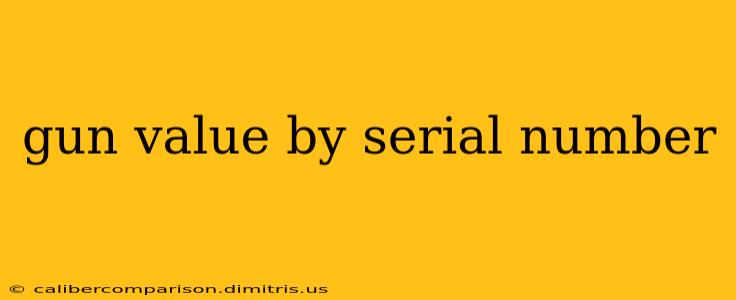Tracing the history and establishing the value of a firearm can be a fascinating process, and the serial number is often the key to unlocking this information. While a serial number alone won't give you the precise market value, it's a crucial piece of the puzzle. This guide provides a comprehensive look at how serial numbers help in gun valuation and what other factors play a significant role.
What a Serial Number Can Tell You
A firearm's serial number acts as its unique identifier. It allows you to trace the gun's manufacturer, the year of manufacture (approximately), and potentially even its original owner (with the right resources). This information is vital because it helps establish:
-
Manufacturer and Model: Identifying the make and model is the first step. Knowing the manufacturer (e.g., Colt, Remington, Smith & Wesson) and the specific model (e.g., 1911, Model 700, Python) significantly impacts the value. Some manufacturers and models are more desirable and command higher prices.
-
Year of Manufacture: This information helps determine the gun's age and condition. Older firearms, particularly those in excellent condition, often hold higher value due to their historical significance or rarity. However, this requires consulting manufacturer records or historical databases – the serial number itself doesn't directly provide the exact date.
-
Potential for Provenance: In some cases, tracing the serial number may reveal the gun's history, including previous owners. A documented history—perhaps through police records or private sales records—can significantly affect the value, especially if associated with notable figures or historical events.
Factors Affecting Gun Value Beyond the Serial Number
While the serial number provides crucial foundational information, other factors heavily influence a firearm's ultimate value:
1. Condition:
This is arguably the most significant factor. Condition is assessed using a grading system (e.g., excellent, very good, good, fair, poor). Factors considered include:
- Bore condition: The condition of the barrel, checked for wear, pitting, and rust.
- Action function: Whether the gun functions correctly and smoothly.
- Metal finish: The level of original finish remaining, and the presence of scratches, dents, or rust.
- Wood (if applicable): The condition of the stock or grips, looking for damage, cracks, or refinishing.
- Accessories: Original box, papers, tools, and other accessories significantly increase value.
2. Rarity and Collectibility:
Certain firearms are more valuable due to their rarity, limited production runs, or historical significance. Limited editions, commemoratives, or guns used in famous events can command significantly higher prices.
3. Market Demand:
The current market demand for a particular firearm significantly impacts its value. Factors such as current trends, media portrayals, and collector interest play a role.
4. Location:
Regional differences in gun laws and collector interest can influence pricing. A firearm highly sought after in one area might be less valuable in another.
How to Find Gun Value Information:
-
Online Gun Forums and Auction Sites: Sites like GunBroker, GunsAmerica, and various firearms forums provide access to sold listings, allowing you to see what similar guns have recently sold for. Remember to compare apples to apples – consider the condition, rarity, and accessories when comparing listings.
-
Gun Value Guides and Books: Several published guides offer estimates for firearm values. These are helpful resources but often lack the granularity to account for specific conditions and regional variations.
-
Appraisals from Licensed Gun Dealers: A licensed firearms dealer specializing in appraisals can provide a professional valuation. This is especially advisable for high-value or rare firearms.
-
Manufacturer Records (If Accessible): While often difficult to access, some manufacturers maintain records that can provide information about a gun's production date and original specifications.
Conclusion:
Determining a gun's value using its serial number is only the first step in a more comprehensive valuation process. The gun's condition, rarity, market demand, and location all contribute to its ultimate worth. By carefully considering all these factors and using the resources mentioned above, you can arrive at a more accurate estimate of your firearm's value. Remember to always prioritize safety when handling firearms. This information is for educational purposes only and does not constitute professional appraisal advice.

